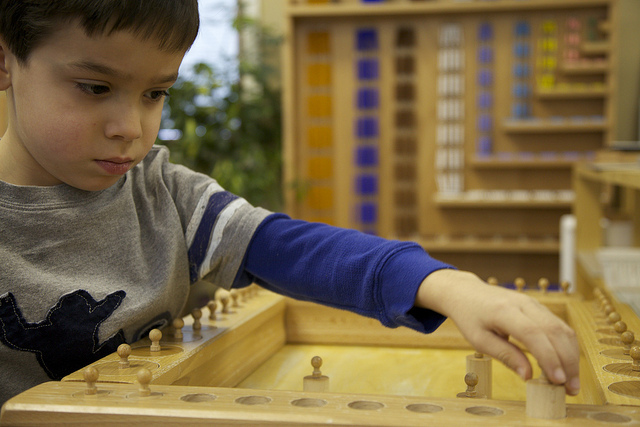
October 31, 2022
How do we address praise in a Montessori classroom?
As many of you know, rewards and punishments are not employed in Montessori, at least not in the conventional sense. In Montessori, there are no stars or stickers, no tests or judgements. Homework? No, not that either. Everything happens more naturally, and in accordance with the aspirations of the child.
So, how do children know that they are on the right path? They feel it. Each and every day a child measures their own progress, with help from the materials and the assistance of the prepared environment. With no teacher to tell them, “Good Job!”, the child desires to accomplish tasks on their own, because they want to. They’re not looking for praise, they’re feeling it.
One of the perfect examples of how Montessori avoids the logic of praise is in the utilization of the materials. Take, for instance, the cylinder blocks, as pictured above. Each wooden cylinder only has one possible spot for it to fit in perfectly. If it’s not correct, the child knows it, and will adjust accordingly. They don’t need an external influence to let them know they did it. They know it themselves.
How do Montessori guides respond to praise inspired formulations? By asking children questions. Here’s an example, one that we are all faced with. A child finishes a painting and brings you their work, exclaiming, “What do you think? Do you like my painting?”, as they hold it up. How would a Montessori teacher respond to this situation? By bringing those questions back towards the child, and sticking to the facts. “Would you like to tell me about it? I see blue and…”
It’s one of the single, most difficult habits to break, offering praise, instead of allowing a child to discover their own confidence. Praise is ingrained in our vocabulary. It’s in our expressions, and everything we do. It’s seemingly always at the tip of our tongue. Yet, what a child needs most is the assurance that they can do it on their own, and for themselves.
The only expression that we’ve found to be adequate enough to address this complex issue, is the phrase, “You did it!” It seems to say everything.
Bobby and June George lead the Baandek Montessori School, an AMI School in Sioux Falls, South Dakota.